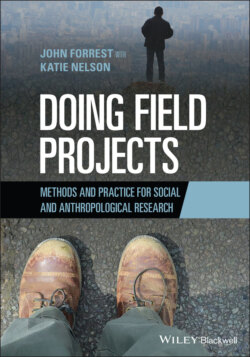Читать книгу Doing Field Projects - John Forrest - Страница 31
Anonymity/Confidentiality
ОглавлениеRoutinely, fieldworkers preserve the anonymity of the people they are engaging with and the places where they have conducted fieldwork when they present their findings. Likewise, you should use pseudonyms for all the people and places involved in your fieldwork. There are special cases where anonymity is next to impossible, but you must make a good faith effort. There are also many cases where anonymity may seem to be absurd. Suppose, for example, you are documenting how your granny makes the chicken soup that has been a family favorite for generations. Using her real name may not seem to be problematic to you, and chances are that it is not. Nonetheless, it is always best to start with pseudonyms. You can use real names later if the need arises, but you cannot hide a real name with a pseudonym after you have revealed it.
Getting into the habit of disguising people and places in your notes and presented materials is also a solidly good practice that you should get used to from the outset. It should end up being second nature to you. Professionals acknowledge that attempts at preserving anonymity are not cast-iron secure. Anyone who is really intent on finding out where (precisely) I have conducted fieldwork and with whom I have worked should be able to discover exact details without too much difficulty. But doing so will take effort, and casually prying minds will be excluded. Likewise, do not share your fieldwork details with others without safeguards in place.
